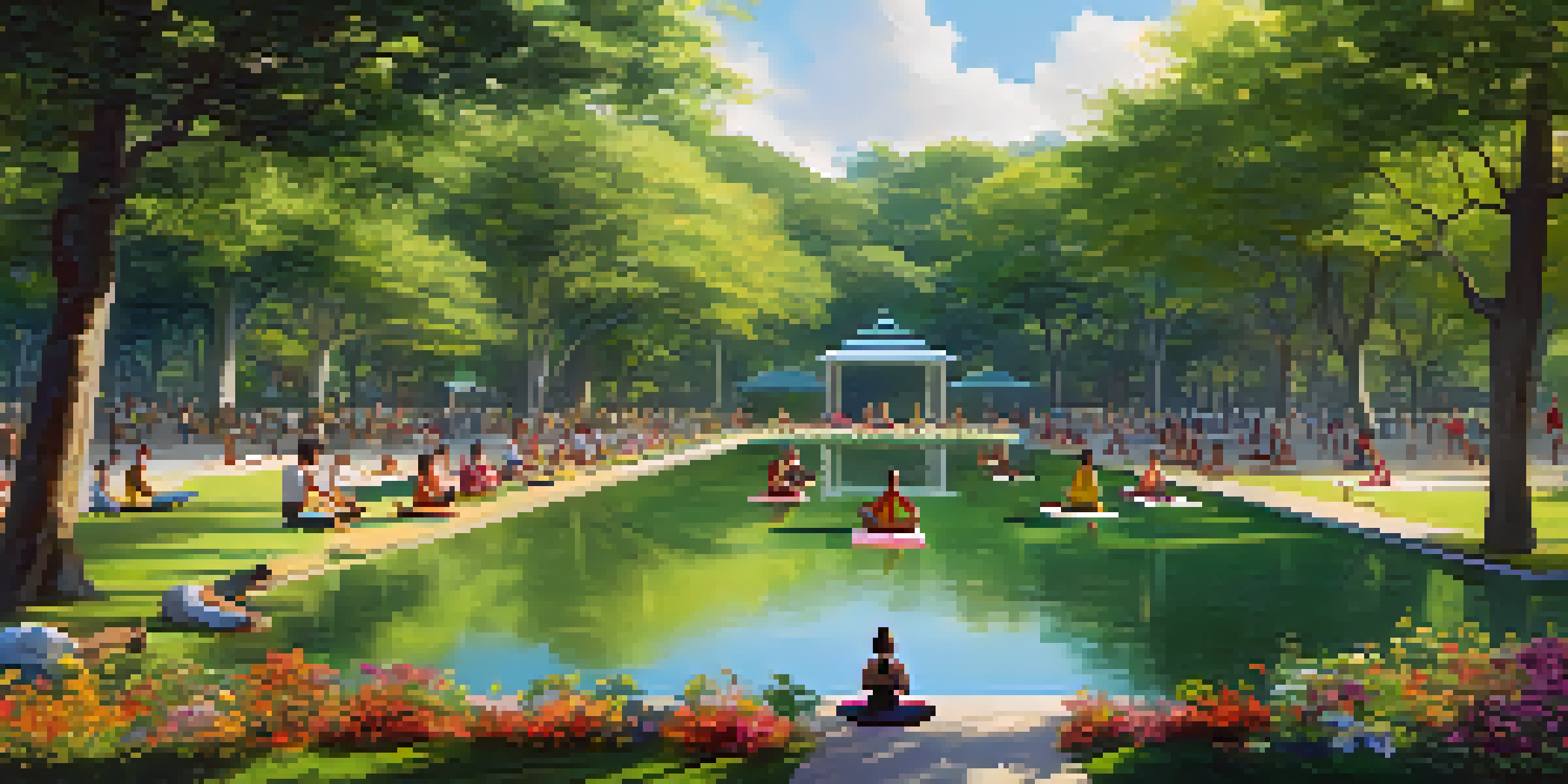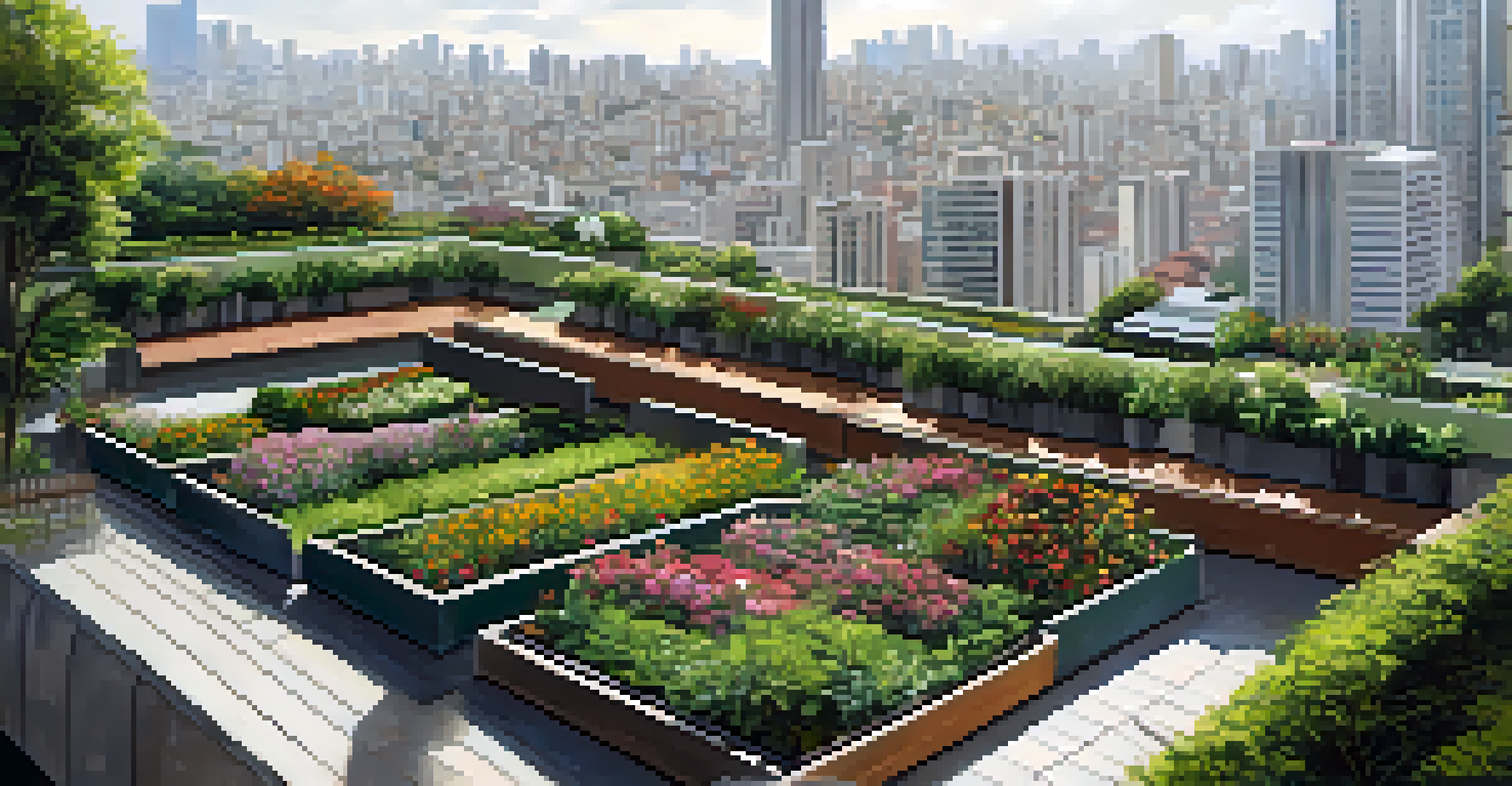How Green Spaces Affect Mental Health in Brazil

Introduction: The Connection Between Nature and Mental Health
Mental health is an increasingly important topic, especially in urban environments. In Brazil, where rapid urbanization has led to a surge in concrete jungles, the role of green spaces becomes crucial. These natural areas offer not just beauty, but also a refuge for our minds, helping to alleviate stress and anxiety.
In every walk with nature one receives far more than he seeks.
Studies have shown that spending time in nature can significantly boost mood and cognitive function. This is particularly relevant in cities like São Paulo and Rio de Janeiro, where the hustle and bustle can take a toll on mental well-being. Green spaces provide a much-needed escape from the chaos of urban life.
Moreover, the physical benefits of green spaces, such as promoting exercise through walking or jogging, further contribute to improved mental health. Engaging in physical activity amidst greenery can create a positive feedback loop, enhancing both physical and mental wellness.
The Science Behind Nature's Impact on Mental Well-Being
Research indicates that exposure to green environments can lower levels of cortisol, the stress hormone. This means that simply being in a park or a garden can help individuals feel more relaxed and at ease. In Brazil, where the climate allows for year-round outdoor activities, this is particularly beneficial.

Additionally, nature helps to restore attention and focus, which can be particularly important in today’s fast-paced world. The concept of 'Attention Restoration Theory' suggests that natural environments provide a restorative effect, allowing our minds to recover from the fatigue caused by constant urban stimulation.
Nature Boosts Mental Health
Spending time in green spaces significantly improves mood and cognitive function, especially in bustling urban environments.
The visual and auditory elements of nature, such as the sight of trees or the sound of birds, engage our senses in a calming way. This sensory engagement can lead to enhanced creativity and problem-solving skills, which are essential for both personal and professional growth.
Green Spaces as Community Hubs in Urban Brazil
Parks and gardens in Brazilian cities serve as vital community gathering spots. They foster social connections, allowing people to interact in a relaxed setting, which is essential for mental health. These interactions can help combat feelings of isolation and loneliness, which are prevalent in urban areas.
Nature does not hurry, yet everything is accomplished.
For instance, events held in parks—like yoga classes or community picnics—encourage people to engage with one another. Such social activities not only enhance community spirit but also provide emotional support, further improving mental well-being.
Moreover, green spaces can also bridge cultural gaps, bringing together diverse groups of people. This sense of belonging and shared experience can be incredibly powerful in creating supportive networks that contribute to overall mental health.
Cultural Significance of Green Spaces in Brazil
In Brazil, parks and gardens are not just recreational spaces; they are cultural treasures. They often feature local flora and fauna, and reflect the rich biodiversity of the country. This connection to cultural heritage can instill pride and a sense of identity among residents.
Moreover, traditional events and festivals often take place in these green areas, reinforcing their importance in community life. For example, the Festa de Iemanjá, celebrated in various coastal cities, showcases how nature and culture intertwine, enhancing mental well-being through celebration and connection.
Community Connections in Parks
Parks serve as vital hubs for social interactions, helping to combat isolation and foster a sense of belonging.
This cultural aspect of green spaces also encourages people to engage with their environment. By promoting environmental stewardship, individuals can develop a deeper appreciation for nature, further enhancing their mental health as they feel more connected to their surroundings.
The Role of Urban Planning in Enhancing Green Spaces
Urban planning plays a crucial role in determining the availability and accessibility of green spaces. In Brazil, many cities are beginning to recognize the importance of integrating nature into their development plans. This shift is vital for ensuring that all residents have access to these mental health-promoting environments.
Innovative projects, such as pocket parks and rooftop gardens, are emerging as solutions to the lack of green areas in densely populated neighborhoods. These initiatives not only beautify urban landscapes but also provide essential benefits for mental well-being.
Moreover, involving the community in the planning process can lead to more inclusive and effective green spaces. When residents have a say in how their local parks are designed and maintained, they are more likely to use and care for these areas, further enhancing their positive impact on mental health.
Challenges in Accessing Green Spaces in Urban Areas
Despite the benefits, access to green spaces remains a challenge in many Brazilian cities. Socioeconomic factors can limit certain communities from enjoying the mental health benefits that nature provides. This disparity highlights the need for equitable urban planning that prioritizes green space accessibility for all.
Additionally, environmental degradation and urban sprawl can lead to the loss of existing green areas. This not only impacts the physical landscape but also diminishes opportunities for individuals to engage with nature, adversely affecting their mental health.
Equitable Access to Green Spaces
Challenges in accessing green areas highlight the need for inclusive urban planning to ensure mental health benefits for all.
Addressing these challenges requires a concerted effort from government, community organizations, and citizens to advocate for sustainable practices. Together, they can work towards preserving and creating green spaces that contribute to the mental well-being of all Brazilians.
Conclusion: Embracing Nature for a Healthier Mind
In conclusion, green spaces play a pivotal role in enhancing mental health across Brazil. They provide a sanctuary from urban stress, foster community connections, and celebrate cultural heritage. As we continue to navigate the challenges of urbanization, it is crucial to prioritize the integration of nature into our cities.
By advocating for more green spaces, we can ensure that everyone has the opportunity to experience the mental health benefits they offer. Whether it's a stroll in a park or a community gathering in a garden, these moments in nature are essential for our well-being.

Ultimately, embracing green spaces is not just about beautifying our cities; it's about nurturing our minds and hearts in an increasingly hectic world. Let’s make a collective effort to cherish and expand these vital resources for a healthier future.